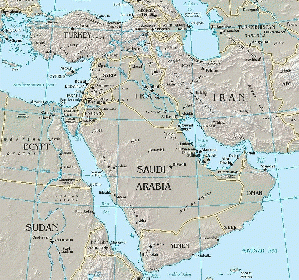
Middle east
(Image by (Not Known) Wikipedia (commons.wikimedia.org), Author: Author Not Given) Details Source DMCA
On February 19, 1998, William Kristol, Robert Kagan, Richard Perle, Elliot Abrams, John Bolton, Frank Carlucci, Doug Feith, Bernard Lewis, Robert McFarlane, Donald Rumsfeld, Caspar Weinberger, Paul Wolfowitz, and many others, addressed an open letter to Bill Clinton demanding that Saddam Hussein's regime be brought down. On March 20, 2003, a coalition led by the United States invaded Iraq. Saddam Hussein was hung on December 30, 2006. This intervention was followed by a series of coups and military operations whose ultimate goal was the dismemberment of the Sykes-Picot Agreement of 1916 and the establishment of a state of chaos in the Middle East. The objective was met. Yet, today the United States is caught in an incredible quagmire with no exit strategy. Let's examine briefly the main consequences of the Iraqi invasion.
Unexpectedly, the new Iraqi president, Nouri al-Maliki, befriended Iran, an avowed enemy of the United States, Israel and Saudi Arabia. Sunnis began to rebel against the Shiite-dominated government, galvanized by the Syrian civil war (armed and funded by the CIA, Saudi Arabia and Qatar). Thanks to pro-consul Paul Bremer's excellent job in destroying Iraq's infrastructure and army, the al-Maliki government was unable to control the rebellion. In 2014, Sunni insurgents formed the Islamic State of Iraq and the Levant (ISIL). Its forces quickly spread throughout Iraq and into Syria. On June 29, 2014, it proclaimed a caliphate to bring Muslim-inhabited regions under its control, including Syria, Jordan, Israel, Lebanon, Cyprus and part of southern Turkey. ISIL is an offshoot of al Qaeda, created at the initiative of Jimmy Carter's National Security Advisor, Zbigniew Brzezinski, to combat the Soviet Union in Afghanistan.
Faced with the ISIL's threat, the United States is in a quandary. It cannot ally itself with Syria or Iran, nor can it count on Saudi Arabia and Turkey. Saudi Arabia is pushing oil prices down to force the United States to honor its promise to get rid of Bashar al-Assad. Turkey refuses to intervene against ISIL as this would strengthen the Kurds. Israel is siding with the Kurds who meet part of its oil needs. Netanyahu is warning Washington against a precipitous conclusion of the nuclear negotiations with Iran to secure an unofficial help against ISIL. Obama's coalition of the willing is shrinking by the day. Neoconservative senators, such as John McCain and Lindsey Graham, are urging the President to put "boots on the ground", with no clearly defined objective or exit strategy.
Meanwhile, Russia which helped resolve the Syrian chemical weapon issue peacefully, continues to be demonized which, as observed by Henry Kissinger, is not a policy. Miffed by Obama's characterization of his country at the General Assembly of the United Nations in September, Putin reminded the American president in an interview with a Serbian newspaper that blackmailing a major nuclear power may have dire consequence for the world's strategic stability.
The geopolitical mess the United States finds itself in is its own doing. Its Middle East policy is in shambles. The brilliant minds who devised it in the late 1990s are silent today.




